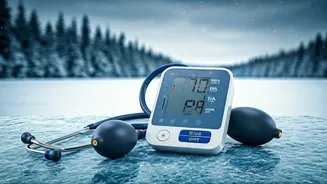Cold Weather's Impact
One of the most significant reasons for increased blood pressure in winter is the direct effect of cold temperatures on the body. When exposed to cold,
blood vessels constrict, becoming narrower. This constriction is a natural response designed to conserve body heat, but it also increases the resistance to blood flow. The heart has to work harder to pump blood through these constricted vessels, leading to a rise in blood pressure. People may also tend to be less active during winter due to inclement weather. This lack of physical activity can contribute to weight gain and further exacerbate the risk of elevated blood pressure. Furthermore, cold temperatures can increase the levels of certain hormones, such as adrenaline, which further constricts blood vessels and raises blood pressure. Staying informed about the impact of cold weather is crucial for effective prevention.
Dietary Changes and Risk
Dietary habits often undergo subtle shifts during winter, which can have significant effects on blood pressure. Comfort foods, which tend to be higher in sodium and saturated fats, become more appealing as the weather cools down. Increased salt intake is directly linked to higher blood pressure, as sodium causes the body to retain water, increasing blood volume and placing more pressure on blood vessels. Additionally, the consumption of processed foods and sugary drinks may rise, indirectly contributing to weight gain and insulin resistance, both of which are risk factors for hypertension. It is essential to be mindful of your food choices during winter, ensuring a balanced diet that is rich in fruits, vegetables, and low in sodium to manage your blood pressure.
Reduced Sunlight Exposure
Winter's reduced sunlight exposure plays a less obvious, but still significant, role in blood pressure fluctuations. Sunlight helps the body produce vitamin D, which is essential for overall cardiovascular health. Vitamin D deficiency is linked to an increased risk of hypertension. The lack of sunlight exposure can also affect the body's circadian rhythm, disrupting sleep patterns. Poor sleep quality is a known contributor to elevated blood pressure. Furthermore, less exposure to sunlight can influence the production of nitric oxide, a compound that helps relax blood vessels. Without adequate nitric oxide, blood vessels may constrict more easily, increasing blood pressure. Therefore, managing your exposure to sunlight or considering vitamin D supplementation during the winter months can be important.
Increased Stress Levels
Stress levels often go up during winter, which can substantially affect blood pressure. The holiday season, with its associated social and financial pressures, can lead to increased stress. Winter also brings darker days and colder weather, which may contribute to seasonal affective disorder (SAD), a form of depression that can impact blood pressure through various physiological pathways. Chronic stress activates the body’s stress response, causing the release of hormones like cortisol and adrenaline. These hormones can increase heart rate, constrict blood vessels, and elevate blood pressure. The impact of stress on blood pressure can be significant, so finding healthy ways to manage stress is crucial. This might include relaxation techniques, regular exercise, or seeking professional support during the winter months.
Tips for Prevention
Several preventative measures can be taken to mitigate the risk of high blood pressure during the winter months. First, regular monitoring of blood pressure is essential, especially if you have a history of hypertension. Staying physically active, even indoors, is important. Engage in regular exercise, like walking, yoga, or indoor sports, to help maintain a healthy weight and cardiovascular function. Paying attention to your diet is equally important; reduce your sodium intake by limiting processed foods and cooking with less salt. Prioritize stress management; practice relaxation techniques, such as deep breathing or meditation, and ensure you get sufficient sleep. Make sure to consult your doctor for any concerns. Following these guidelines can help you proactively manage your blood pressure throughout the winter, contributing to overall health and well-being.















